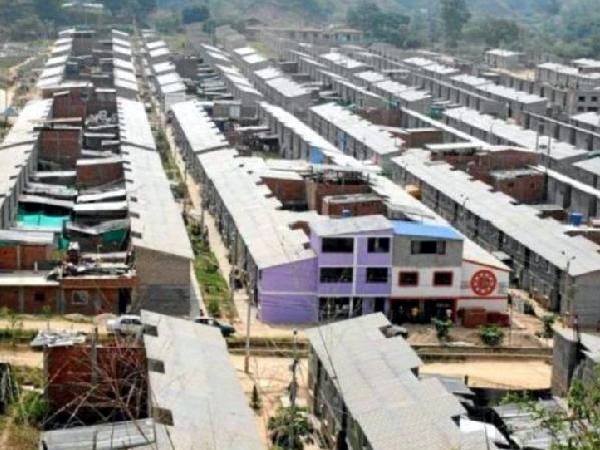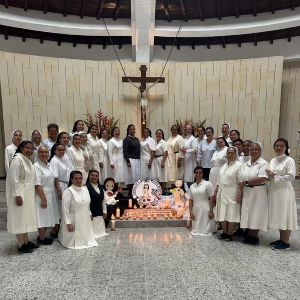THE COMMUNITY OF SAN JOSÉ – SAN JUAN GIRÓN (SANTANDER) - COLOMBIA
- Care for pastoral heath, provide spaces for human promotion and stay close to those who have been marginalized -
 Ciudadela Nueva GirónCiudadela Nueva Girón (Santander-Colombia), Project's Group of the Solidarity.- In 2005 the Province of Bucaramanga chose to accompany a lot of families from Girón (Santander) who, were affected by the winter Saverio, and shelter in the settlement of “Bambúes”. This aid has been provided by the nearby community in Santa Cruz district, to strengthen the evangelizing work of the parish, care for pastoral heath, provide spaces for human promotion and stay close to those who have been marginalized due to natural disasters or the armed conflict in this area. When the local administration faces the problem of these families building a total of 1200 homes of ongoing development called “Ciudadela Nueva Girón”, the Sisters of San José local community, in a process of search and judgement, decide, in 2009, to carry on walking with the vulnerable population, chosen by the local government to be relocated in these new living places.
Ciudadela Nueva GirónCiudadela Nueva Girón (Santander-Colombia), Project's Group of the Solidarity.- In 2005 the Province of Bucaramanga chose to accompany a lot of families from Girón (Santander) who, were affected by the winter Saverio, and shelter in the settlement of “Bambúes”. This aid has been provided by the nearby community in Santa Cruz district, to strengthen the evangelizing work of the parish, care for pastoral heath, provide spaces for human promotion and stay close to those who have been marginalized due to natural disasters or the armed conflict in this area. When the local administration faces the problem of these families building a total of 1200 homes of ongoing development called “Ciudadela Nueva Girón”, the Sisters of San José local community, in a process of search and judgement, decide, in 2009, to carry on walking with the vulnerable population, chosen by the local government to be relocated in these new living places.
COMMUNITY WORK IN CIUDADELA NUEVA GIRÓN
Determined to give appropriate and specific answers to the needs of evangelism and the promotion of people, the Sisters of San José Community, besides taking the process of resettlement of families, start taking part in family educational programmes, social and environmental living, conflict overcoming and income creation.
Little by little, they create network and strategic alliances with other institutions to strengthen their commitment to this extremely susceptible village, the local administration of Girón, the Corporation of the “Meseta of Bucaramanga”, the Popular Female Organization and some universities nearby.
ENDOGENOUS COMMUNITY DEVELOPMENT PROJECT
In 2013, the Dominican Sisters of Charity of the Presentation has the chance to renew the interinstitutional cooperation agreement with Universidad Autónoma de Bucaramanga (UNAB), signed in 2011. This agreement aims to join efforts to develop programmes and projects which benefit vulnerable and high social risk situation communities, performing academic continuing education activities, consulting and research. Upon renewal, both sides agree to design a community development plan in order to meet the needs of the population in “Ciudadela Nueva Girón”. The project involves two projects:
1. Research phase
It is a first attempt to approach reality, in which Sisters, university teachers, students and the citizens of Ciudadela, especially women, take part. Research is done on the key developing fields, such as health, education, income, public policies and social infrastructure, which are essential in their developing process. On this first stage, the relevance of participation by the entire population is reaffirmed in order to design and implement a management model that guarantees sustainability and maximizes the impact of the programmes, for the benefit of the community.
2. Training phase and community organization
Training is the key focus of the project, and people are motivated to get it. Given the potential wealth that is observed in the female population of the Ciudadela, three groups of women are formed:
- The leaders, integrated by representatives of the seven sectors of the Ciudadela. Their Training focuses on developing their abilities of leadership, convocation, commitment, and social and sense of belonging to the community..
- Businesswomen, women with entrepreneurship who manage small charity economies. They receive training according to the “Canvas” business model.
- The women of the community organization group, they assume the commitment of being a force of service unity creating spaces for participation, as well as being linked to other organizations’ activities and to the Parish.
LEARNT LESSONS
- Generating processes of intervention in a community at high risk of social exclusion, has allowed us to change our own paradigm to accompany, attend and empower women in the project, keeping them motivated without resorting to paternalistic or economic stimuli.
- The solutions to specific and real needs do not come from us or from those of us who have joined for this purpose; these people tell us what they need, what the solutions are and what strategies should be used.
- The processes are slow, they require time and encourage patience, shared value, sense of hope and must, which are all oriented to strengthening household and restoring its values.
- The beneficiaries -process performers- are the ones who evangelise us. They are the protagonists of their own development, also responsible for deploying all their human and community resources to improve their own quality of life and that of their fellow citizens.
- Making the beneficiaries aware that training and self-management are the two best ways to serve the community organization.
Photo Album...


 EN
EN  ES
ES  FR
FR 




